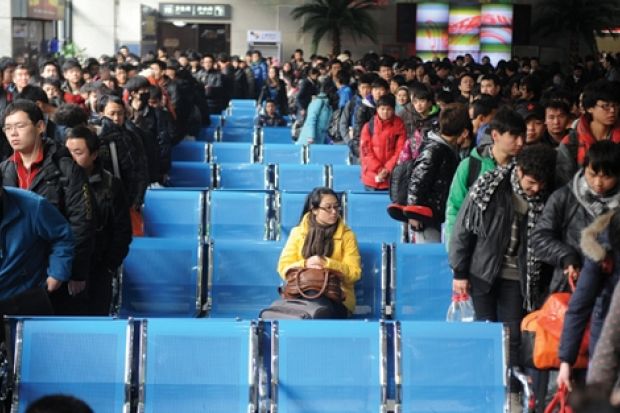Mark Harper, the immigration minister, has rejected calls from universities to remove overseas students from the net migrant count, saying there is no “logical reason” to make the change.
Speaking to Times Higher Education in his first interview on students and immigration, Mr Harper sought to reassure universities that they are entering a stable period after major changes to the student visa regime.
The number of new non-European Union students enrolling on courses at UK higher education institutions fell in 2011-12, according to figures released last week by the Higher Education Statistics Agency.
The drop, from 174,225 to 173,560, was the first fall since such Hesa data began in 1995.
There was also a large decrease in the number of students from the Indian subcontinent studying at UK universities, including a 24 per cent decline from India itself (see graphic below).
Won’t go changing
Mr Harper, who replaced Damian Green as immigration minister in the reshuffle last September, said he had told sector representatives in recent meetings that “broadly we’ve done a lot of the big change and we’re in an area where there will be a lot more policy stability”.
And he has agreed with Universities UK and the Russell Group of large research-intensive universities that at “a suitable point” there will be “an opportunity when I will be able to say that directly…to their members”.
UUK has urged the government to withdraw international students sponsored by universities from the net migrant count - meaning that universities would be spared any effects of the government’s drive to reduce net migration to the “tens of thousands” by 2015.
However, when asked if he could envisage a situation where the government could make this change, Mr Harper issued a “no”.
He added: “The international definition that’s used is that if you change your country of residence for more than a year, you are a migrant. Frankly, if we weren’t going to count students, it’s not obvious why we wouldn’t count lots of other people.”
Migrant workers living in the UK for a short period and overseas students both use transport and public services, Mr Harper noted.
“Yes, [the students are] paying fees to come here, but in the same way someone coming here to work for a private sector employer is contributing to that company’s economic success. I don’t see any logical reason why we would treat them [overseas students] differently,” he added.
Mr Harper noted Canada’s proposal last month to limit study permits to students attending institutions designated by provinces and territories. “Canada is one of the countries oft cited as a competitor country, and it is introducing a system actually very similar to ours,” he added.
Following UUK’s criticisms about the supposedly negative impact overseas of the government’s immigration “rhetoric”, Mr Harper said that ministers “always say that we want good students to come here, (that) we’ve got a very high-quality university sector”.
He added: “Some of the rhetoric around the attractions or not of Britain are often not…made by ministers…sometimes they are even made by people in the sector, which is, I think, sometimes a little self-defeating.”
Mr Harper also defended the decision to strip London Metropolitan University of its licence to sponsor international students, describing it as “absolutely right”.
However, he noted the concerns expressed over students “who were here legitimately”.
Referring to the task force that was set up to help London Met’s students, he said: “Clearly, if some of that had been in place right at the beginning, then some of the publicity, particularly overseas, may have been more favourable. That’s something I shall think about if we ever have to do this again.”




